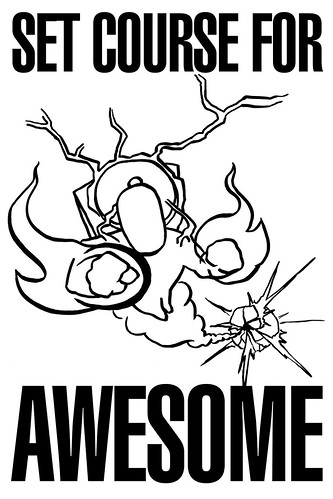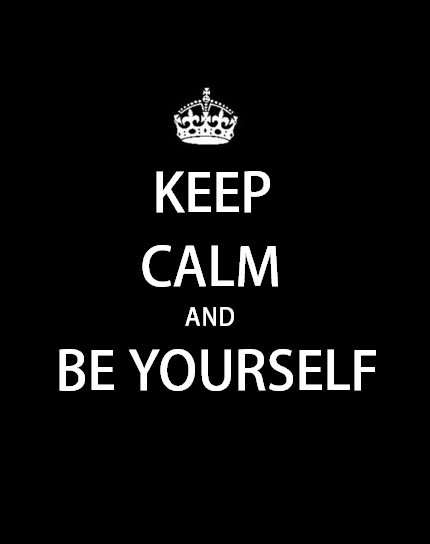Set Course For Awesome (as a ‘Career Tester’)
I’ve been asked to do a 15-ish minute talk as part of Anne-Marie Charrett and Fiona Charles‘ upcoming workshop at STPCon on being a Career Tester (as compared to going into Management or Consultant — even though I have been both). As I thought about this, I think this could actually turn into a keynote worthy talk (of course, then I would actually have to practice it?!), but I have come up with what I think is basically my advice to myself of 15 years ago when I landed on this career path. Now of course, to deliver it as a double-stuffed-lightning-talk for them.
Set Course For Awesome

Testing is an awesome and rewarding career. But it is also ‘new’ even in the larger context of IT jobs which are themselves new in the grand scheme of things. This means that unlike someone in the trades, the career path for testers isn’t well defined and everyone’s will be slightly (or significantly) different. The thing that will be common to them all though is that those who are happy(est) will have taken responsibility for their career and planned it out. The plan may not work out, and will almost guaranteed to need course corrections along the way, but the act itself is useful. So set a course for awesome. (And lets not concern ourselves about the alternatives to that shall we? Great.)
Shut Up and Listen

It was during RST with James Bach that I really understood that the role of a tester isn’t to ‘break the app’ or ‘find all the bugs’ but to provide information about the application. It wasn’t until some time later than I realized that it is actually more subtle than that. Our job is to provide information that matters. And how do we do that? Easy. We Shut Up and Listen. To what? That is also easy. To the people we are providing the information to. Now that I’ve completed PSL I can safely start quoting Gerry Weinberg so here are two useful things to remember.
- No matter how it looks at first, it’s always a people problem
- Things are the way they are because they got that way
If you can start to understand the people in the system you are operating in, and why the [larger] system operates the way it does then you can provide them the information they need. But you can’t do that unless you stop, shut up, and listen.
Hooray

Too often people let others drive their career trajectory or they just listlessly bounce from one place to another. This handy venn diagram should help you organize your thoughts. Make the three lists. Find the Hooray point. That is your destination. Or more correctly, your current destination as it is likely to change as you experience new things. You are not the person you were five years ago, and you are not today who you will be in five years. I actually have a large copy of this that needs framing and will go on my office wall.
Steal Like an Artist

I’m going to say this right now. In March. That Steal Like an Artist is my Tester Book of the Year for 2012. And it has no direct links to testing. Which is also part of the point. Not only are the 10 points in it completely relevant to being a tester but it comes from a different field entirely. Go outside of the testing community for inspiration. One of my first public testing talks was about being a houseleague lacrosse coach. The most useful books for my testing practice recently have been about how the brain handles stress, how to really practice something and about apprenticeship patterns. None of them were written by testers, but each made me a much better tester. Take inspiration from everything and everyone. When you are constantly looking for it, it is amazing how often you can find it.
Be Yourself

The trick to Stealing Like an Artist vs blind theft is that artists make what their steal their own. You will not truly succeed just regurgitating words and ideas that you heard from people at conferences or read on their blogs. The two I see all the time is the SFDPO mnemonic and the notion of testing tours. Think of your own. I know you mean well by parroting it, but internalize it, morph it, evolve it until it is yours. It is impossible for you to be anybody but yourself. So don’t try. Take what you like and what inspires you, make it part of you, and ignore the rest.
Have a Therapist

Talk to everyone you can. But have a couple close people you can bounce ideas and questions off of. Both for ‘shop’ and life in general. You might be smart, but someone is always smarter. You can’t grow if you just talk to yourself or your teddy bear. And it works the same way too. Some of the best lunch chats I’ve had have been initiated by me but I went home with less notes than the person I was trying to talk something through with. The term mentor I think is too constrained. Remember, its always a people problem and people problems require therapists.
Be Totally Fucking Amazing

Quality this, Quality that. Blah. Blah. Blah. As a tester, you shouldn’t fall into the trap of thinking ‘Quality is Job One’. Its not. Being totally fucking amazing is job one. Your customers do not care that the code is quality, or that it follows some style guide line or has only 0.45444 bugs per 1000 lines of code. They care that it is amazing. That’s all. The same applies for your career. Whoop-dee-freakin-do that you have been at the same company for 10 years and got a commemorative clock (do they even do that any more??!?). Are you being amazing anymore? If not, why are you still there? Print out the Hooray graph, plot your course to awesome and go be totally fucking amazing.
Here is the slideshare link to share amongst yourselves.